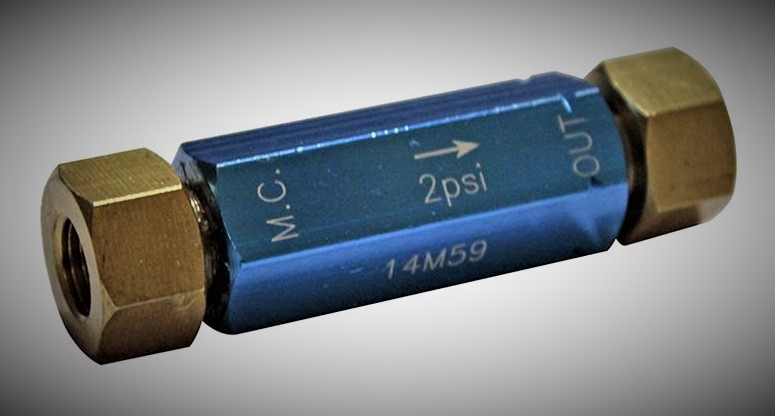Q: Would you please explain residual valves?
…
A: A residual pressure valve is a special type of one-way check valve. They are used to keep a small amount of pressure in the brake lines. This helps the brakes engage more quickly and reduces pedal travel.
There are two basic types of residual valves — 10 psi and 2 psi.

How do you identify residual valves?
In the aftermarket, 10 psi valves are usually red. The 2 psi valves are usually blue. However, other colors are available. The valves should be located on or near the master cylinder.
In OEM applications, the residual pressure valve is usually built into the master cylinder. In this case, an external valve is not required.
When are residual valves used?
A 10 psi residual valve is used with drum brakes. The valve holds 10 psi in the brake lines going to the wheel cylinders. This keeps pressure against the return springs inside the drum. This means the brakes engage faster with less pedal travel.
Most disc brake systems do not require a residual valve. However, a 2 psi residual valve is used when the master cylinder is lower than the calipers.
When the master cylinder is mounted on the firewall, it is usually higher than the calipers. Gravity keeps the fluid from flowing backward. In this case, a residual valve is not required.
In some vehicles, the master cylinder is relocated to a lower position. This could be under the floor or on the frame rail. In this design, a residual valve is required to prevent fluid back-flow.
Without a residual valve, the pedal could feel “spongy.” It would also take more pedal travel to move enough fluid to engage the brakes.
Notes
- When converting from drum to disc brakes, you should remove the 10 psi valve.
- The constant line pressure causes the brakes to drag.
- This will cause overheating and premature wear.
…
This is another in a series of weekly Q&A Mailbag sessions with Summit Racing‘s tech department, in which there are hundreds more. Click here to see them all.

I can remember”Residual Valves” on older delivery Trucks/Vans that had 4 wheel Drum Brakes, it made a Major Difference in braking. Also the Older VW(air cooled types 1&2 with 4 wheel drum brakes,It was bad enough you would have to adjust them monthly,,,,, With these Valve’s you could go 6 months between adjusting
[…] Q: Would you please explain residual valves? … A residual pressure valve is a special type of one-way check valve. They are used to keep a small amount of pressure in the […] Read full article at http://www.onallcylinders.com […]
Hydraulic brake systems can be a source of considerable uncertainty to many here among us. If you feel like that statement applies to you, then take a moment to understand the reason why you may feel this way. If you feel confident or even enjoy working on any of the many other components on your car, then with reasonable skills and a sharp eye focused on safety related items, the braking system becomes very much like any of the other sub-systems on your car.
With a proper set of instructions from a certified source, uncertainty becomes confidence in your ability to do a safe and effective repair. Typical brake repair and overhaul jobs commonly list the familiar parts of a brake system. Most folks that are familiar with the common parts that require replacement during a brake repair job don’t need to be reminded of everything involved.
However, there might be a lesser known part that requires attention. Hence the very question that’s answered by the On All Cylinders Staff. What is a RESIDUAL VALVE ? That question was answered precisely and to the point by OAC, without going into an overload of irrelevant information that would probably just add to the uncertainty mentioned at the beginning of this comment. NICELY DONE OAC ! Keeping it simple rather than complicating it with excessive bull shirts.
Dear Sir,
As requested by our client, please advise us if you manufacture the following :
01 ea Residual Pressure Valve 2 PSI PN 260-13783.
Please quote your best price and delivery time of the above item CIF Balikpapan, Indonesia by air courier.
I appreciate for your prompt response, and thank you.
Regards,
aris